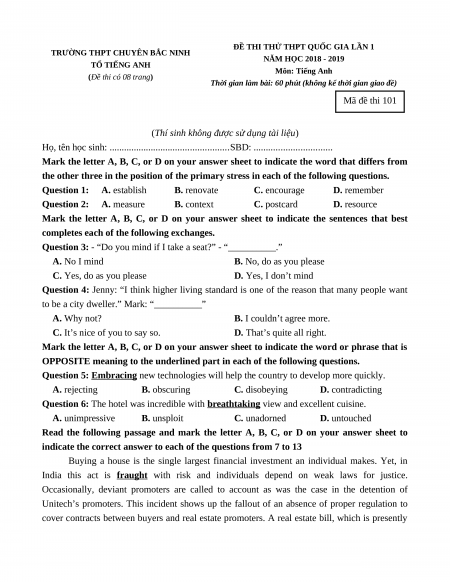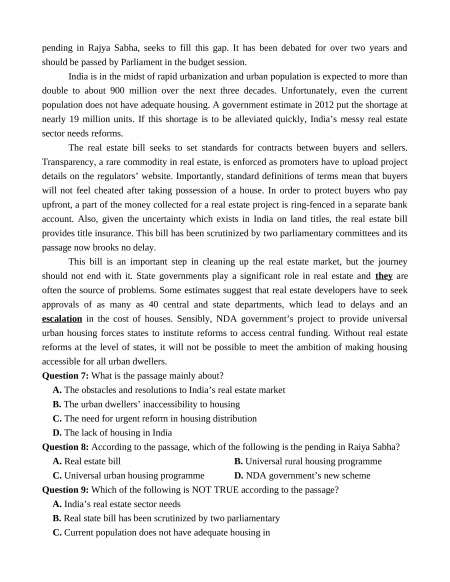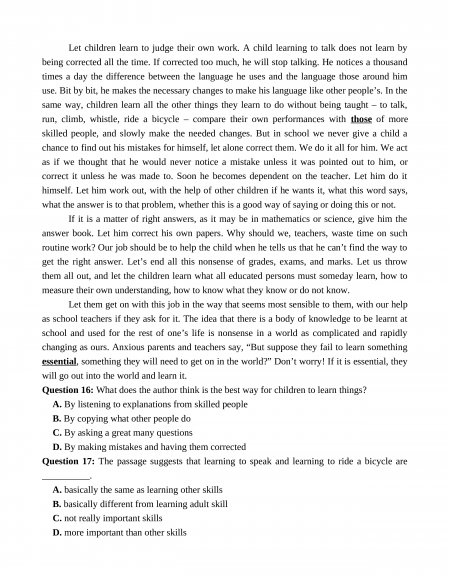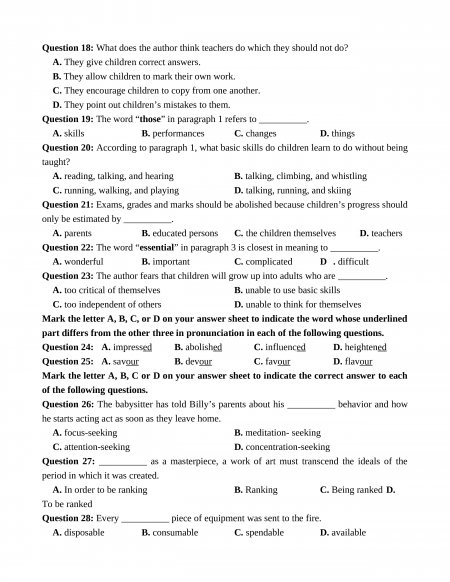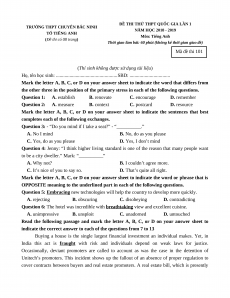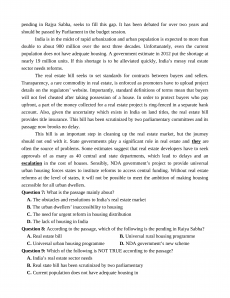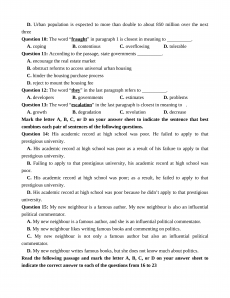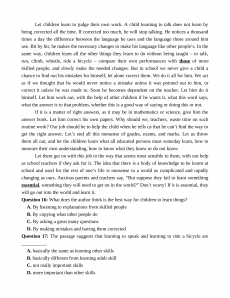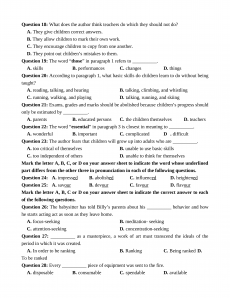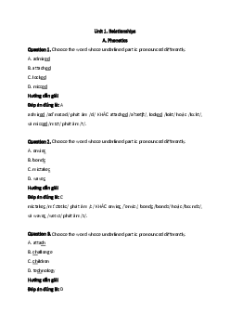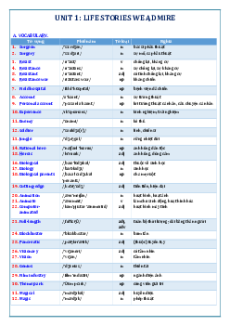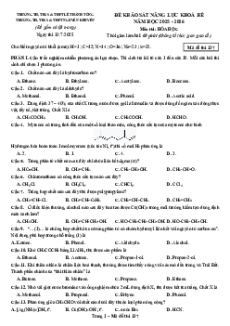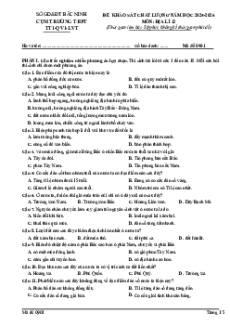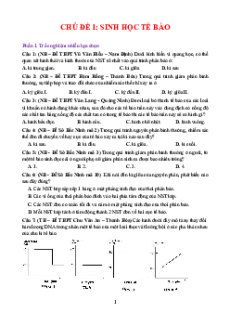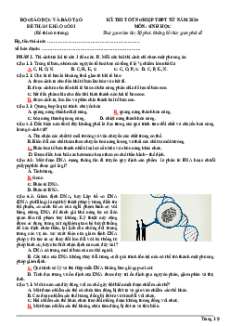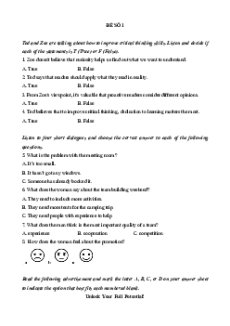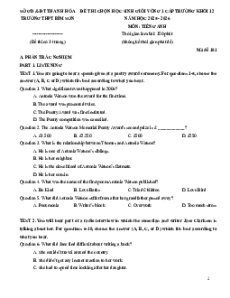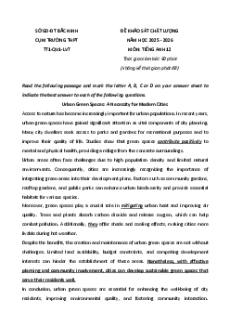ĐỀ THI THỬ THPT QUỐC GIA LẦN 1
TRƯỜNG THPT CHUYÊN BẮC NINH NĂM HỌC 2018 - 2019 TỔ TIẾNG ANH Môn: Tiếng Anh
(Đề thi có 08 trang)
Thời gian làm bài: 60 phút (không kể thời gian giao đề) Mã đề thi 101
(Thí sinh không được sử dụng tài liệu)
Họ, tên học sinh: .................................................SBD: ................................
Mark the letter A, B, C, or D on your answer sheet to indicate the word that differs from
the other three in the position of the primary stress in each of the following questions. Question 1: A. establish B. renovate C. encourage D. remember Question 2: A. measure B. context C. postcard D. resource
Mark the letter A, B, C, or D on your answer sheet to indicate the sentences that best
completes each of the following exchanges.
Question 3: - “Do you mind if I take a seat?” - “__________.” A. No I mind B. No, do as you please
C. Yes, do as you please D. Yes, I don’t mind
Question 4: Jenny: “I think higher living standard is one of the reason that many people want
to be a city dweller.” Mark: “__________” A. Why not?
B. I couldn’t agree more.
C. It’s nice of you to say so.
D. That’s quite all right.
Mark the letter A, B, C, or D on your answer sheet to indicate the word or phrase that is
OPPOSITE meaning to the underlined part in each of the following questions.
Question 5: Embracing new technologies will help the country to develop more quickly. A. rejecting B. obscuring C. disobeying D. contradicting
Question 6: The hotel was incredible with breathtaking view and excellent cuisine. A. unimpressive B. unsploit C. unadorned D. untouched
Read the following passage and mark the letter A, B, C, or D on your answer sheet to
indicate the correct answer to each of the questions from 7 to 13
Buying a house is the single largest financial investment an individual makes. Yet, in
India this act is fraught with risk and individuals depend on weak laws for justice.
Occasionally, deviant promoters are called to account as was the case in the detention of
Unitech’s promoters. This incident shows up the fallout of an absence of proper regulation to
cover contracts between buyers and real estate promoters. A real estate bill, which is presently
pending in Rajya Sabha, seeks to fill this gap. It has been debated for over two years and
should be passed by Parliament in the budget session.
India is in the midst of rapid urbanization and urban population is expected to more than
double to about 900 million over the next three decades. Unfortunately, even the current
population does not have adequate housing. A government estimate in 2012 put the shortage at
nearly 19 million units. If this shortage is to be alleviated quickly, India’s messy real estate sector needs reforms.
The real estate bill seeks to set standards for contracts between buyers and sellers.
Transparency, a rare commodity in real estate, is enforced as promoters have to upload project
details on the regulators’ website. Importantly, standard definitions of terms mean that buyers
will not feel cheated after taking possession of a house. In order to protect buyers who pay
upfront, a part of the money collected for a real estate project is ring-fenced in a separate bank
account. Also, given the uncertainty which exists in India on land titles, the real estate bill
provides title insurance. This bill has been scrutinized by two parliamentary committees and its passage now brooks no delay.
This bill is an important step in cleaning up the real estate market, but the journey
should not end with it. State governments play a significant role in real estate and they are
often the source of problems. Some estimates suggest that real estate developers have to seek
approvals of as many as 40 central and state departments, which lead to delays and an
escalation in the cost of houses. Sensibly, NDA government’s project to provide universal
urban housing forces states to institute reforms to access central funding. Without real estate
reforms at the level of states, it will not be possible to meet the ambition of making housing
accessible for all urban dwellers.
Question 7: What is the passage mainly about?
A. The obstacles and resolutions to India’s real estate market
B. The urban dwellers’ inaccessibility to housing
C. The need for urgent reform in housing distribution
D. The lack of housing in India
Question 8: According to the passage, which of the following is the pending in Raiya Sabha? A. Real estate bill
B. Universal rural housing programme
C. Universal urban housing programme
D. NDA government’s new scheme
Question 9: Which of the following is NOT TRUE according to the passage?
A. India’s real estate sector needs
B. Real state bill has been scrutinized by two parliamentary
C. Current population does not have adequate housing in
D. Urban population is expected to more than double to about 850 million over the next three
Question 10: The word “fraught” in paragraph 1 is closest in meaning to __________. A. coping B. contentious C. overflowing D. tolerable
Question 11: According to the passage, state governments __________.
A. encourage the real estate market
B. obstruct reforms to access universal urban housing
C. hinder the housing purchase process
D. reject to mount the housing fee
Question 12: The word “they” in the last paragraph refers to __________. A. developers B. governments C. estimates D. problems
Question 13: The word “escalation” in the last paragraph is closest in meaning to . A. growth B. degradation C. revolution D. decrease
Mark the letter A, B, C, or D on your answer sheet to indicate the sentence that best
combines each pair of sentences of the following questions.
Question 14: His academic record at high school was poor. He failed to apply to that prestigious university.
A. His academic record at high school was poor as a result of his failure to apply to that prestigious university.
B. Failing to apply to that prestigious university, his academic record at high school was poor.
C. His academic record at high school was poor; as a result, he failed to apply to that prestigious university.
D. His academic record at high school was poor because he didn’t apply to that prestigious university.
Question 15: My new neighbour is a famous author. My new neighbour is also an influential political commentator.
A. My new neighbour is a famous author, and she is an influential political commentator.
B. My new neighbour likes writing famous books and commenting on politics.
C. My new neighbour is not only a famous author but also an influential political commentator.
D. My new neighbour writes famous books, but she does not know much about politics.
Read the following passage and mark the letter A, B, C, or D on your answer sheet to
indicate the correct answer to each of the questions from 16 to 23
Let children learn to judge their own work. A child learning to talk does not learn by
being corrected all the time. If corrected too much, he will stop talking. He notices a thousand
times a day the difference between the language he uses and the language those around him
use. Bit by bit, he makes the necessary changes to make his language like other people’s. In the
same way, children learn all the other things they learn to do without being taught – to talk,
run, climb, whistle, ride a bicycle – compare their own performances with those of more
skilled people, and slowly make the needed changes. But in school we never give a child a
chance to find out his mistakes for himself, let alone correct them. We do it all for him. We act
as if we thought that he would never notice a mistake unless it was pointed out to him, or
correct it unless he was made to. Soon he becomes dependent on the teacher. Let him do it
himself. Let him work out, with the help of other children if he wants it, what this word says,
what the answer is to that problem, whether this is a good way of saying or doing this or not.
If it is a matter of right answers, as it may be in mathematics or science, give him the
answer book. Let him correct his own papers. Why should we, teachers, waste time on such
routine work? Our job should be to help the child when he tells us that he can’t find the way to
get the right answer. Let’s end all this nonsense of grades, exams, and marks. Let us throw
them all out, and let the children learn what all educated persons must someday learn, how to
measure their own understanding, how to know what they know or do not know.
Let them get on with this job in the way that seems most sensible to them, with our help
as school teachers if they ask for it. The idea that there is a body of knowledge to be learnt at
school and used for the rest of one’s life is nonsense in a world as complicated and rapidly
changing as ours. Anxious parents and teachers say, “But suppose they fail to learn something
essential, something they will need to get on in the world?” Don’t worry! If it is essential, they
will go out into the world and learn it.
Question 16: What does the author think is the best way for children to learn things?
A. By listening to explanations from skilled people
B. By copying what other people do
C. By asking a great many questions
D. By making mistakes and having them corrected
Question 17: The passage suggests that learning to speak and learning to ride a bicycle are __________.
A. basically the same as learning other skills
B. basically different from learning adult skill
C. not really important skills
D. more important than other skills
Document Outline
- Mark the letter A, B, C, or D on your answer sheet to indicate the word that differs from the other three in the position of the primary stress in each of the following questions.
- Mark the letter A, B, C, or D on your answer sheet to indicate the sentences that best completes each of the following exchanges.
- Mark the letter A, B, C, or D on your answer sheet to indicate the word or phrase that is OPPOSITE meaning to the underlined part in each of the following questions.
- Read the following passage and mark the letter A, B, C, or D on your answer sheet to indicate the correct answer to each of the questions from 7 to 13
- Mark the letter A, B, C, or D on your answer sheet to indicate the sentence that best combines each pair of sentences of the following questions.
- Read the following passage and mark the letter A, B, C, or D on your answer sheet to indicate the correct answer to each of the questions from 16 to 23
- Mark the letter A, B, C, or D on your answer sheet to indicate the word whose underlined part differs from the other three in pronunciation in each of the following questions.
- Mark the letter A, B, C or D on your answer sheet to indicate the correct answer to each of the following questions.
- Mark the letter A, B, C, or D to indicate the word or phrase that is CLOSEST in meaning to the underlined part in each of the following questions.
- Mark the letter A, B, C or D on your answer sheet to indicate the underlined part that needs correction in each of the following questions.
- Read the following passage and mark the letter A, B, C, or D on your answer sheet to indicate the word(s) that best fits each of the numbered blanks from 43 to 47
- Mark the letter A, B, C, or D on your answer sheet to indicate the sentence that is closest in meaning to each of the following questions.
